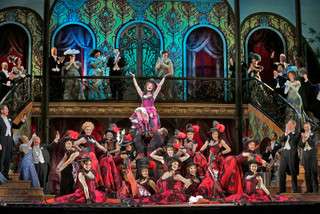|
Back
Schmaltzy New Merry Widow Underwhelms New York
The Metropolitan Opera
12/31/2014 - & January 3, 6, 8, 13,* 17, 23, 28, 31, April 24, 27, 30, May 7, 2015
Franz Lehár: The Merry Widow
Jeff Mattsey (Vicomte Cascada), Sir Thomas Allen (Baron Mirko Zeta), Kelli O'Hara (Valencienne), Emalie Savoy (Sylviane), Wallis Giunta (Olga), Margaret Lattimore (Praskowia), Alek Shrader (Camille de Rosillon), Alexander Lewis (Raoul de St. Brioche), Daniel Mobbs (Kromow), Gary Simpson (Pritschitsch), Mark Schowalter (Bogdanovitch), Carson Elrod (Njegus), Renée Fleming (Hanna Glawari), Nathan Gunn (Count Danilo Danilovitch), Andrea Coleman (Woman), Jason Simon (Maitre D')
The Metropolitan Opera Orchestra and Chorus, Sir Andrew Davis (conductor)
Susan Stroman (production and choreography), Julian Crouch (sets), William Ivey Long (costumes), Paule Constable (lights)

(© Ken Howard)
Hot on the heels of last season's visually sumptuous but dramatically flat new production of Johann Strauss's Die Fledermaus, this year's New Years Eve audience was treated to the Met's retake on the repertoire's other great operetta, Franz Lehár's The Merry Widow. Presented entirely in English with an original book by Jeremy Sams, it still delivers the basic outline of the comic tale of the poor fictional Balkan nation of Pontevedro and its attempt to save its tottering finances by arranging the marriage of its richest citizen, the young widow Hanna Glawari, to the fading playboy diplomat Count Danilo, who happens to be her old flame. A comedy of errors reunites them as a true love match accompanied by a fortuitous financial boon for Danilo and, perhaps, for Pontevedro as well.
Traditionally, the Met has presented at least the spoken dialogue of its operetta and light opera productions in English, sometimes preserving the native language for the sung score. This has rarely been a fortunate choice, and this rather corny new Merry Widow, which the company has only ever done in English, is no exception. Sams wrote the English language libretto for the Met's undemanding Renaissance pastiche The Enchanted Island and here delivers a cliché-ridden ramble of bad puns, cloying metaphors, dumb jokes, tedious malaproprisms, and hackneyed quips that make one wince far too often to enjoy the better aspects of the performance. Susan Stroman's production, her Met debut, delivered a Disneyfied version of Belle Époque Paris with all the expected attributes. Its most creative edge was the transition from Act II to Act III, when inventive use of the Met's sliding stage transforms Hanna Glawari's garden into Chez Maxim's. Originally a choreographer, Stroman's talent shined most strongly in the production's finely executed and truly glittering waltzes and can-cans.
The production's casting promised a blockbuster evening. In taking on the role of Hanna Glawari, Renée Fleming's first foray into the operetta genre promised much amusement. Yet the voice often sounded too large and too heavy for the role. At times she seemed to try to hold back enough to deliver the lines in the style of the work. But despite her physical allure and undeniably strong stage presence, the result often led to devoiced lines that betrayed overcompensation. The opposite was true for Broadway star Kelli O'Hara, who brought her vivacious music theater voice to the operatic stage for the first time in the role of Valencienne. As her lover Camille de Rosillon, Alek Shrader seemed more in his element in this lighter tenor part than he does in his lyrico-spinto opera roles. Baritone Nathan Gunn's Danilo also fared well, with crisp diction and strong comic acting despite the utter banality of his lyrics. Veteran baritone Sir Thomas Allen's Baron Mirko Zeta added a fine comic presence. Carson Elrod's ham performance as Njegus, a spoken role in this production, was too annoying to demand much attention.
The Met orchestra and chorus acquitted themselves with a superb performance under the baton of Sir Andrew Davis.
Paul du Quenoy
|